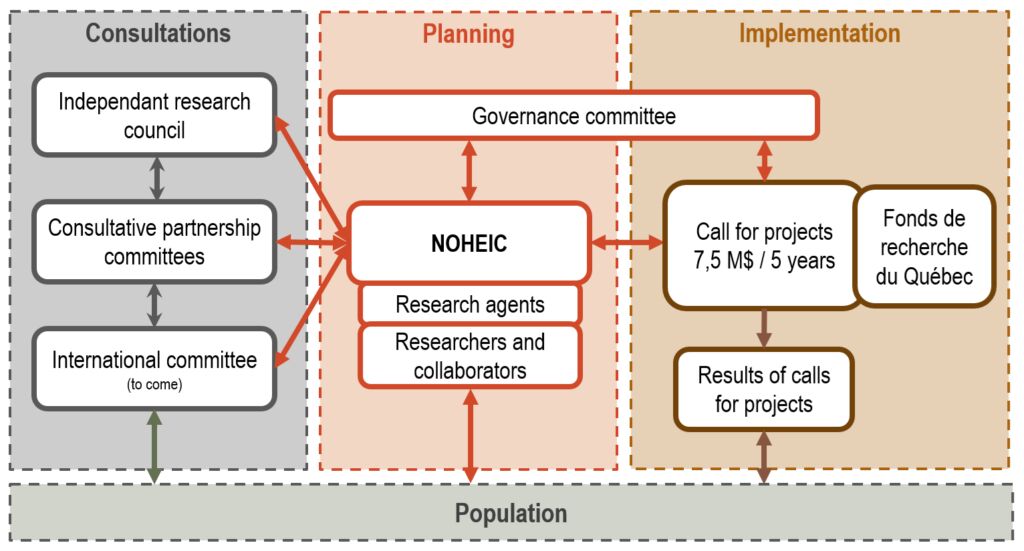About us
Origin and mandate
Located at the Université du Québec en Abitibi-Témiscamingue (UQAT), the National observatory on health and environmental impacts of contaminants (NOHEIC) was announced as part of the government action plan aimed at supporting Rouyn-Noranda. In collaboration with the ministère de l’Économie, de l’Innovation et de l’Énergie (MEIE), the Fonds de recherche du Québec (FRQ), and UQAT, a total government investment of $10 million was allocated to advance scientific knowledge. During the 2023–2024 fiscal year, the Government of Quebec provided UQAT with $500,000 to initiate the Observatory’s activities, and allocated $9.5 million to the FRQ–Santé to support NOHEIC and implement its scientific planning up until 2028. Thus, in August 2023, UQAT's board of directors formally approved the establishment of an independent research observatory.
The NOHEIC mobilizes and enhances understanding of environmental and health issues associated with smelters. Anchored in an approach emphasizing sustainable health, the Observatory fosters synergies within the research ecosystem, supports informed decision-making, and promotes the adoption of sustainable practices to facilitate socio-ecological transitions.
Specifically, the objectives of NOHEIC are to:
- Develop, consolidate, and disseminate scientific knowledge and data related to smelters, while encouraging the exploration of opportunities for improvement and solutions in the areas of health as well as environmental, societal, and technological considerations.
- Establish interdisciplinary collaboration to propose improvements in economic, public health, and occupational health sectors, among others, and form an independent scientific council comprised of researchers from the fields of health, social sciences, environment, and technology.
- Provide neutral and credible information upon which the government and its agencies can rely when implementing guidelines, regulations, and adjustments to standards.
Fundamental principles and values
The NOHEIC has adopted four fundamental principles to guide its mission (refer to the founding text for comprehensive definitions):
Sustainable health: Sustainable health is an integrated approach aimed at achieving optimal population well-being by addressing all determinants of health while preserving ecosystems and ensuring equity across generations. It combines prevention, promotion, technological innovation, and transformation of services within a systemic and intersectoral perspective.
Socio-ecological transition: Socio-ecological transition refers to the shift toward a sustainable economic and social model integrating environmental, social, ethical, and political considerations to address climate crises, biodiversity loss, resource scarcity, and health risks. This transition relies on interdependent transformations, including energy, agrifood, and climate transitions.
Social innovation: Social innovation is defined as a new and sustainable solution addressing a clearly identified social need, adopted by a community, organization, or institution, and generating measurable collective benefit. It is characterized by transformative and systemic impacts and represents a departure from existing practices.
Intersectorality: Intersectorality refers to collaboration between various sectors or disciplines to combine expertise, better understand complex issues, and design integrated and coherent solutions. The NOHEIC fosters collaborative research, dialogue with users and society, and knowledge sharing to ensure enhanced social integration of research outcomes.
Values
The NOHEIC adheres to values that uphold research integrity, specifically honesty, fairness, trust, responsibility, and openness. These values are fundamental to academic freedom, with the NOHEIC scientific council serving as their guarantor.
Structure

Governance Committee
The governance committee approves the scientific planning of the NOHEIC, the work programming, the projected annual budgets, the activity reports, and the annual financial statements. It also ensures the proper use of public funds. The committee is composed of members as well as observers.
Member organizations:
- Fonds de recherche du Québec – Nature et technologie (FRQNT)
- Fonds de recherche du Québec – Santé (FRQS)
- Ministère de l’Économie, de l’Innovation et de l’Énergie (MEIE)
- Université du Québec en Abitibi-Témiscamingue (UQAT)
- National observatory on health and environmental impacts of contaminants (NOHEIC)
Observer organizations:
- Direction générale de la santé publique (DGSP) of the Ministère de la Santé et des Services sociaux (MSSS)
- Ministère de l’Environnement, de la Lutte contre les changements climatiques, de la Faune et des Parcs (MELCCFP)
Scientific council
The scientific council is responsible for guiding the scientific orientations of the NOHEIC. It monitors the state of knowledge and identifies existing gaps, establishes research priorities, and detects opportunities for innovation. It provides direction on methodological choices, proposes strategies for mobilizing the scientific community and disseminating knowledge, ensures the engagement of researchers, safeguards the scientific independence of the institution, reviews NOHEIC’s outputs, and validates the admission of new members.
Affiliation of scientific council members:
- Centre Armand-Frappier Santé Biotechnologie, Institut national de la recherche scientifique (INRS)
- Centre technologique des résidus industriels (CTRI), Cégep de l’Abitibi-Témiscamingue
- Geological Survey of Canada (GSC), Natural Resources Canada (NRCan)
- Université de Montréal (UdeM)
- Université du Québec à Montréal (UQÀM)
- Université du Québec en Abitibi-Témiscamingue (UQAT)
- Université de Sherbrooke (UdS)
Team
The NOHEIC team is composed of a main manager responsible for the strategic leadership of the observatory and the supervision of two employees: a professional specialized in data analysis and a professional dedicated to information management and dissemination.
Research community members
Membership in the NOHEIC offers individuals engaged in research or action in environmental health the opportunity to join a space for exchange and collaboration that promotes the advancement of knowledge and the development of solutions tailored to environmental and public health challenges.